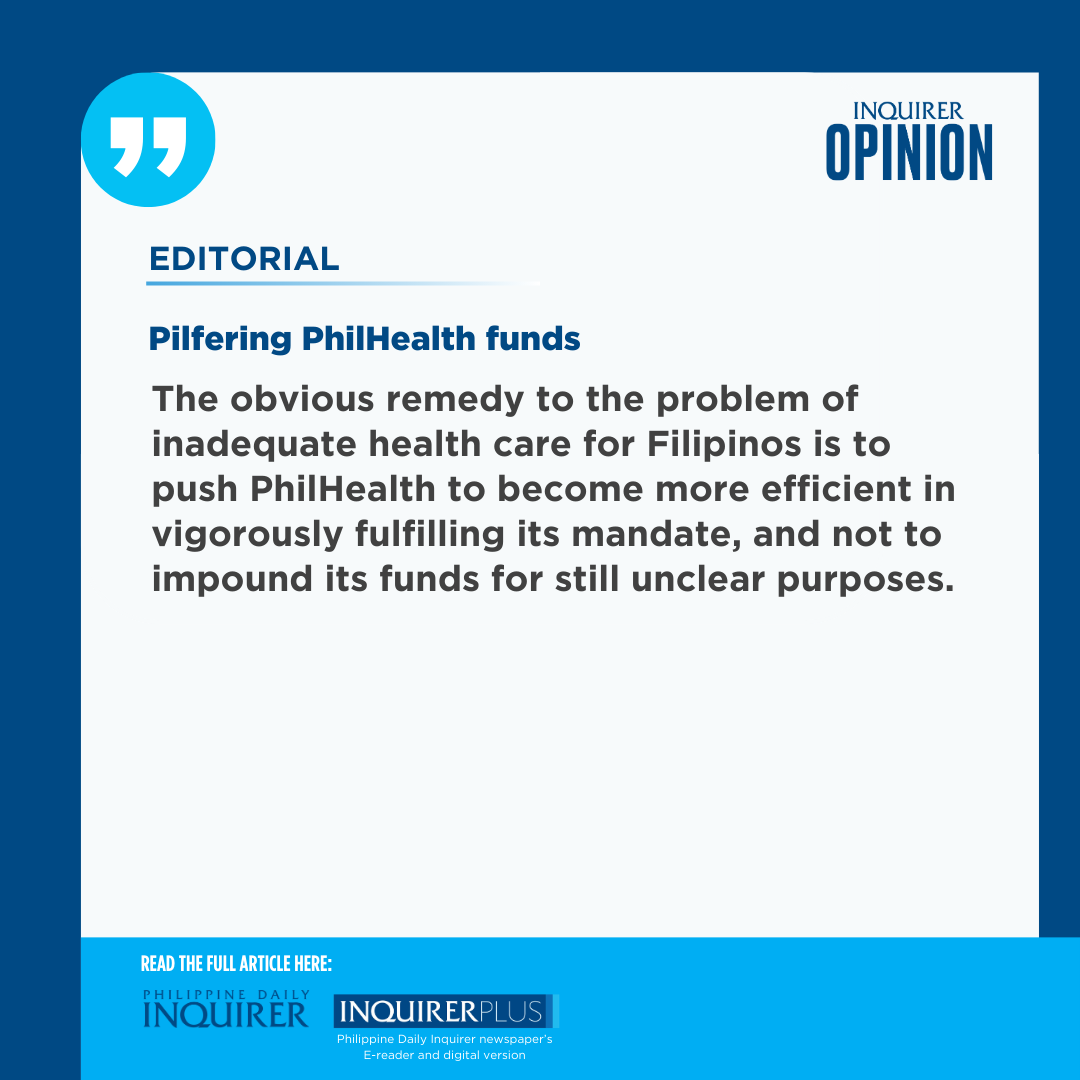Pilfering PhilHealth funds
Just how easily government officials can fiddle with funds of the Philippine Health Insurance Corp. (PhilHealth) was on full display last week, when its president Emmanuel Ledesma Jr. raised the possibility of lowering premium rates following the controversial impounding of almost P90 billion of unused government subsidy to the national health insurer.
At a hearing of the Senate committee on health and demography, senators questioned the Department of Finance’s (DOF) order to return unused PhilHealth funds to the treasury after a directive to all government-owned and -controlled corporations (GOCC) to revert “idle” funds for “unprogrammed appropriations” in the national budget.
Article continues after this advertisementAt the prodding of the panel chair, Sen. Christopher “Bong” Go, Ledesma enthusiastically said that after the hearing, he would “convene [the PhilHealth] team and we will recommend … a reduction in the premium contribution rates to President Marcos immediately.”
Ledesma’s proposal came barely seven months after PhilHealth raised its members’ premium rate from four to five percent in January despite opposition from Health Secretary Teodoro Herbosa.
‘What the hell …’
But the jubilation over Ledesma’s offer was short-lived after Herbosa pointed out that a reduction in membership contributions was unheard of.
Article continues after this advertisement“I don’t know what the hell [Ledesma] is talking about,” said Herbosa, the ex-officio chair of PhilHealth’s board of directors. “I have never heard PhilHealth ever decrease the payment of its members. I also don’t know if there’s a mechanism to decrease the PhilHealth contribution. I don’t know a law or ruling to implement that,” he said.
Such confusion over its own rules and policies underscores the unacceptable state of affairs at PhilHealth, the agency mandated to provide universal health coverage for all Filipinos under Republic Act No. 11223, or the Universal Health Care Act. Are PhilHealth funds subject to the whims of government officials and not in accordance with the law?
Recall that the premium rate hike was opposed by many sectors amid reports of corruption in the agency, fanned even more now that it turns out that the national health insurer had billions in “unused” funds while majority of Filipinos still do not have access to health care.
Irrational move
The DOF circular directing GOCCs to turn over their unused funds to the treasury may sound reasonable to agencies whose mandate does not directly affect the health and well-being of the public, and whose fund utilization had been disappointingly low.
But for PhilHealth to be sitting on unused funds while being remiss in funding more health packages that could have benefitted majority of ailing Filipinos, is the height of irresponsibility. How can PhilHealth have almost P90 billion just lying around—unutilized and must now be turned over to the government to help boost the economy—when millions of Filipinos don’t even have access to basic health services?
Those who support such irrational move have argued that the almost P90 billion did not come from the contributions of paying members—the working Filipinos who pay between P500 to P5,000 depending on their income—but from government subsidy for indigents, senior citizens, persons with disabilities, and Pantawid Pamilyang Pilipino Program beneficiaries. But isn’t that even more contemptible and unjust? Why remove the health-care subsidy for the poorest of the poor, especially at a time when unbridled inflation gobbles up what little they have?
‘Illegal and unconstitutional’
Taking away PhilHealth subsidy where it is most needed becomes even more abominable when one learns the reason behind the government culling unused funds from GOCCs: legislators reportedly realigned items in the budget to their pet projects, thus leaving foreign-assisted projects and other programs without funding. Such debacle has now forced the executive branch to scramble for new sources of funds for a host of “unprogrammed appropriations.”
Oppositors to the DOF circular affecting PhilHealth have sought relief from the Supreme Court with a temporary restraining order against the transfer of the P89.9 billion.
In their petition, Senate Minority Leader Aquilino “Koko” Pimentel III, some former government officials, and public health advocates have called the transfer “illegal and unconstitutional,” saying that “there can be no greater disservice to Filipinos than infringing upon their right to health.”
But while the Supreme Court might defer to the executive prerogative on the matter, it is still within the powers of Mr. Marcos to immediately set this situation right by exempting PhilHealth funds from the DOF circular.
After all, if the P89.9 billion would really be spent for health programs, as supposedly promised by Finance Secretary Ralph Recto, why the need to take them away from PhilHealth in the first place? The obvious remedy to the problem of inadequate health care for Filipinos is to push PhilHealth to become more efficient in vigorously fulfilling its mandate, and not to impound its funds for still unclear purposes.

















